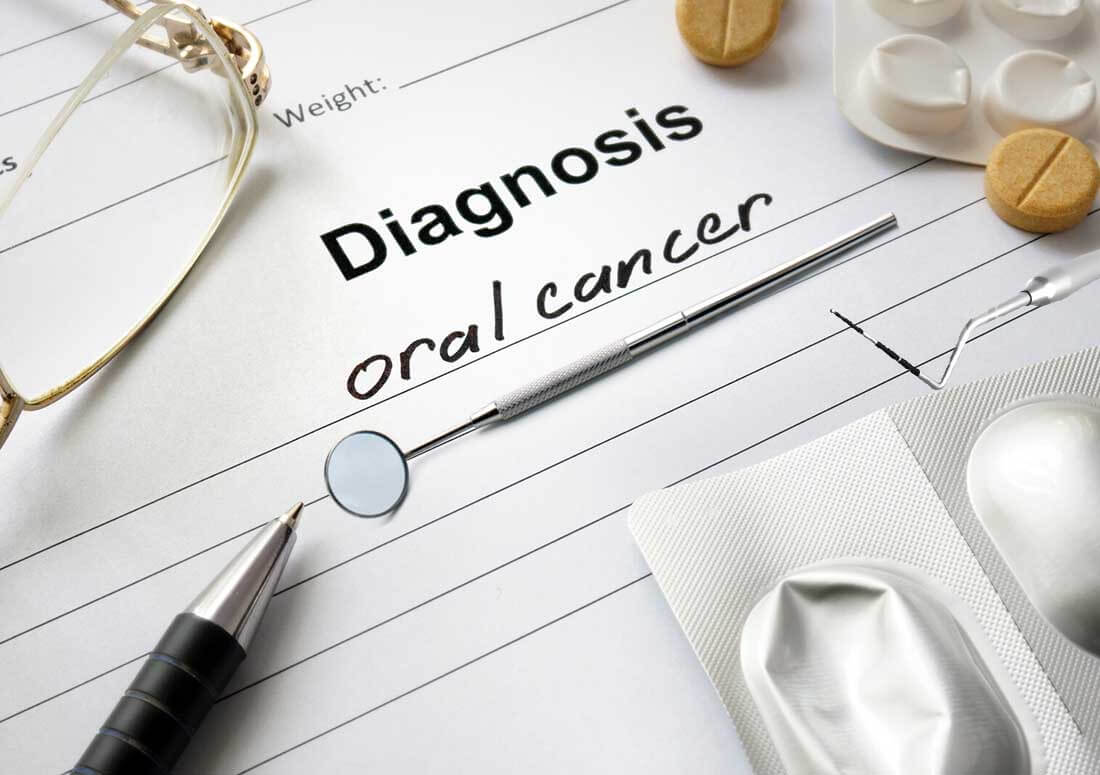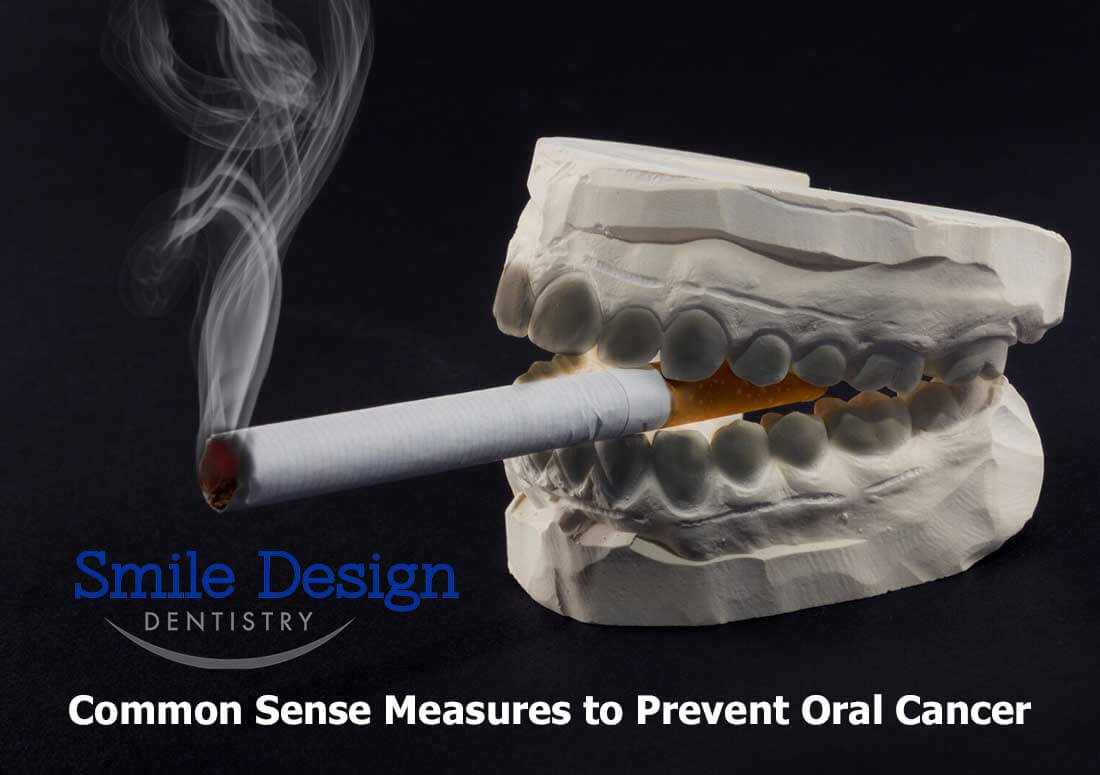Why are Oral Cancer Screenings so Important?
As part of Smile Design Dentistry’s comprehensive dental services, we can help you put together a plan to ward off oral health issues.
There should be no question that oral cancer screening is important. Cancer.net estimates that 51, 540 people will be diagnosed this year with oral cancer. Of those 51,540 a little more than 10,000 will die from the disease. The 5-year survival rate for those with oral cancer is even a little more dire as only 65% of those diagnosed will survive past 5 years. With early diagnosis and treatment, the survival rate jumps to 85%.
That should be enough to convince most of us that oral cancer screening is important, but establishing the fact that oral cancer screening is important is the easy part of this article. With advanced dental technology, it is easier to detect than ever. It may be helpful to answer some questions you have:
Answers to Common Questions about Oral Cancer
- Just what is oral cancer?
- How do I know if I have oral cancer?
- What are the symptoms of oral cancer and how can I get oral cancer screening?
Are Gum Cancer and Mouth Cancer the Same?
Oral cancer, which may also be called mouth cancer or gum cancer, is a cancer of the mouth. It can be divided into 2 categories per the ADA (American Dental Association).
1. Those occurring in the oral cavity (your lips, the inside of your lips and cheeks, teeth, gums, the front two-thirds of your tongue and the floor and roof of your mouth)
2. Those occurring in the oropharynx (middle region of the throat, including the tonsils and base of the tongue).
Since early diagnosis is important on treating any disease or cancer, knowing some of the warning signs yourself is helpful in knowing if you should be checked. We urge every family that we serve to set up a plan for preventive dentistry to protect their overall health.
Early Signs of Oral Cancer or Precancerous Lesions
If you notice any of these symptoms you should go see your dentist or physician to have it checked out.
- Patches appear in your mouth that look red or white and don’t go away.
- Irritation and/or soreness in your mouth that just doesn’t go away.
- A feeling of pain, tenderness or numbness in the mouth or lips.
- You notice a lump, thickening of an area, rough or crusty spots or even a small eroded area.
- If you have difficulty chewing, swallowing, speaking or moving your tongue or jaw?
- If you close your mouth, is there a change in the way your teeth fit together?
The problem is that if we aren’t feeling the symptoms listed above many of us don’t often look thoroughly in our mouths beyond our teeth. While we provide state-of-the-art modern dental care, the doctors at Smile Design Dentistry are also professionals in recognizing the warning signs of oral cancer that are listed above. We know that dentists check for oral cancer but what are the other methods we can use for early detection
How to Detect and Prevent Oral Cancer
Are there any preventive steps we can take to prevent oral cancer?
As stated above, the first method is to have an annual physical with your physician. A part of that physical will be your physician looking inside your mouth for oral cancer signs. These dental checkups to protect your smile design will also include an oral cancer screening.
Dentists are probably even more versed than physicians in recognizing oral cancer since they are working in people’s mouths all day long. While we have an expertise in reconstructive dentistry, our doctors can also quickly quickly identify most oral concerns. During your dental exam, your dentist will at some point pick up a piece of gauze and ask you to stick out your tongue. It is at this time that your dentist is doing an oral cancer screening. They will hold your tongue with the gauze to lift and move it around, looking for any of the oral cancer signs listed above. They will also ask you if you have felt any of the irritations or discomforts listed above.
Your physician may do something very similar. In the event that something suspicious is found by your provider, they will inform you, then either take a small sample for biopsy or recommend you schedule an appointment to have the area of concern biopsied. The results of those test will tell you if treatment is indicated. The use of implants for oral rehabilitation may become necessary if an increase in complications and chronic inflammation occurs.
As the old saying goes, “An ounce of prevention is worth a pound of cure”. The first step in prevention is knowing some of the risk factors for oral cancer. Preventative care is key to anti-aging dentistry.
How to Recognize the Risk Factors of Oral Cancer?
* First, men are twice as likely as women to get oral cancer as they get older.
* Growing older, in general, will increase our likelihood of developing oral cancer.
* Smoking, drinking excessively and poor diets can increase the chances of oral cancer.
* The human papilloma virus (HPV) is a sexually transmitted disease that has also been associated with throat cancers in the back of the mouth. HPV has been attributed to the rise in throat cancers in non-smoking adults.
* If you have previously had oral cancer your chances of recurrence are greater.
From the list above HPV has most recently been associated with increased risk of orophryngeal concerns. HPV is a very common viral infection associated with various health issues including oral cancer. It also has a readily available vaccine. Early vaccination in childhood can be an important step in cancer prevention that a parent can take for their child, girls and boys alike!
Also, regarding the list above there are a few of the factors that are out of our control.
Additional Oral Cancer Risk Factors Outside of Anyone’s Control
Are some risk of getting oral cancer beyond a person’s control?
Like the gender that we are born with, or our age. However, there are certain things like a proper diet and smoking that we can control to help lower our risk.
So outside of diet and smoking preventing oral cancer will mostly rely on early detection and early detection is attained through self-examination, regular preventive visits to your dentist and regular physicals with your physician. These combined will be the “ounce of prevention” you are looking for to ensure your dental and overall health is sound.
In addition to regular visits to your dentist and physician, there are products touted to assist in the early detection of oral cancer. One of those products is ViziLite oral cancer screening. ViziLite is a system where your dentist asks you to rinse with a solution. After rinsing a chemiluminescent light source system is applied.
If there are areas of concern in one’s mouth, the solution will cause the areas to glow brightly under the chemiluminescent light source making is much easier for the provider to see areas of potential oral cancer. At first glance, this seems to make sense as a preventive measure since isn’t it always better to see something more clearly?
Should VizilLite (or a similar product) be a preventive oral cancer measure you should request from your provider?
To answer that question, I found what Stephen Barret M.D. had to say in a recent article in Dental Watch. “In 2013, the Canadian Agency for Drugs and Technologies in Health searched the literature and located 13 studies of ViziLite and two other light-based screening adjuncts, VELscope and Identafi.
The reviewers concluded that “the available evidence does not support the use of the evaluated tools for the screening of cancer in the general population or those at low risk for malignancy.” None of the studies measured cost-effectiveness [22].
ViziLite’s promoters would like you to believe that the risk of getting oral cancer is high and that all adults should undergo annual screening with ViziLite Plus. The key question, however, is how often such screening will find precancerous changes in the mucous membranes not visible with the naked eye that, if found, would lead to increased survival. As far as I can tell, the answer is “not often enough to make the test worthwhile,” stated Dr. Barret.
Can Vizilite, VELscope or Identafi Save Lives?
In layman’s terms what Dr. Barret wanted to find out is if Vizilite, VELscope or Identafi saved lives through improving early detection by providers. Nobody actually knows how many adults these products could help, but it is estimated that it is probably well less than 10% of those who develop oral cancer.
The increase is not significant enough to warrant a recommendation for use in addition to medically accepted cancer screening methods. I’m not saying that these products are bad or provide no value. They just haven’t proven useful enough to warrant a recommendation. At least not yet.
As I stated above, most diseases including cancer have the best outcomes when caught and treated early. Early treatment saves on reconstructive dentistry costs in the long run.
Take Action: Schedule Routine Oral Cancer Screening
Is there less risk of getting oral cancer if oral cancer screenings occur?
If you take steps as directed above to make oral cancer screening a part of your health routine you will be in the population most likely to detect and have it treated early. Dr. Brett Moore and Dr. Corey Jensen at Smile Design Dentistry are strong believers in prevention and include oral cancer screenings in their exams at Smile Design Dentistry.
If you are unsure if your healthcare providers perform oral cancer screenings, ask them. Your oral impacts your overall heath, which makes it of the upmost importance. If it currently isn’t a part of their exam routine ask them if it can be included or possibly find new providers. This ounce of prevention is well worth it! Read fast facts about cancer to see how effective prevention is.
Summary
It is important to us that you have an excellent understanding of your current oral health. This will help us prioritize dental care that is your most important investment. Call our health-centered dental practice where your complete health is our number-one priority. We are truly a Plymouth, MN patient-focused dental care facility offering the latest and best in cosmetic dentistry.
Phone 763-537-1238 to schedule your dental appointment.
 Brian Denn is the Clinic Manager at Smile Design Dentistry in Plymouth, Minnesota. Brian has over 25 years of dental practice management involving making practices run smoother and patient experiences better. He also leads a dental practice managers group staying abreast of the latest dental practice management trends.
Brian Denn is the Clinic Manager at Smile Design Dentistry in Plymouth, Minnesota. Brian has over 25 years of dental practice management involving making practices run smoother and patient experiences better. He also leads a dental practice managers group staying abreast of the latest dental practice management trends.




